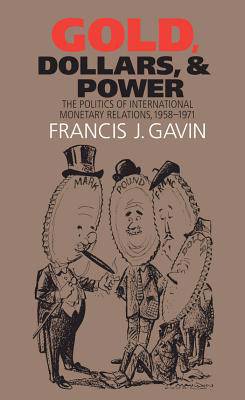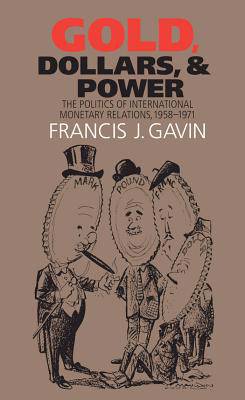
Je cadeautjes zeker op tijd in huis hebben voor de feestdagen? Kom langs in onze winkels en vind het perfecte geschenk!
- Afhalen na 1 uur in een winkel met voorraad
- Gratis thuislevering in België vanaf € 30
- Ruim aanbod met 7 miljoen producten
Je cadeautjes zeker op tijd in huis hebben voor de feestdagen? Kom langs in onze winkels en vind het perfecte geschenk!
- Afhalen na 1 uur in een winkel met voorraad
- Gratis thuislevering in België vanaf € 30
- Ruim aanbod met 7 miljoen producten
Zoeken
Gold, Dollars, and Power
The Politics of International Monetary Relations, 1958-1971
Francis J Gavin
€ 64,45
+ 128 punten
Omschrijving
How are we to understand the politics of international monetary relations since the end of World War II? Exploiting recently declassified documents from both the United States and Europe and employing economic analysis and international relations theory, Francis Gavin offers a compelling reassessment of the Bretton Woods system of fixed exchange rates and dollar-gold convertibility.
Gavin demonstrates that, contrary to the conventional wisdom, Bretton Woods was a highly politicized system that was prone to crisis and required constant intervention and controls to continue functioning. More important, postwar monetary relations were not a salve to political tensions, as is often contended. In fact, the politicization of the global payments system allowed nations to use monetary coercion to achieve political and security ends, causing deep conflicts within the Western Alliance. For the first time, Gavin reveals how these rifts dramatically affected U.S. political and military strategy during a dangerous period of the Cold War.
Gavin demonstrates that, contrary to the conventional wisdom, Bretton Woods was a highly politicized system that was prone to crisis and required constant intervention and controls to continue functioning. More important, postwar monetary relations were not a salve to political tensions, as is often contended. In fact, the politicization of the global payments system allowed nations to use monetary coercion to achieve political and security ends, causing deep conflicts within the Western Alliance. For the first time, Gavin reveals how these rifts dramatically affected U.S. political and military strategy during a dangerous period of the Cold War.
Specificaties
Betrokkenen
- Auteur(s):
- Uitgeverij:
Inhoud
- Aantal bladzijden:
- 280
- Taal:
- Engels
- Reeks:
Eigenschappen
- Productcode (EAN):
- 9780807859001
- Verschijningsdatum:
- 1/11/2007
- Uitvoering:
- Paperback
- Formaat:
- Trade paperback (VS)
- Afmetingen:
- 152 mm x 239 mm
- Gewicht:
- 476 g

Alleen bij Standaard Boekhandel
+ 128 punten op je klantenkaart van Standaard Boekhandel
Beoordelingen
We publiceren alleen reviews die voldoen aan de voorwaarden voor reviews. Bekijk onze voorwaarden voor reviews.









